#almost the worst part of this is that akechi respecting joker for his loyalty tells you how little he respects himself
Explore tagged Tumblr posts
Text
"why not join me instead?" akechi's "invitation" in conf 7
People come and go on whether this question of Akechi's is genuine or not. Opinions run the gamut from "I hate him for trying to take you away from your friends" to "Akechi wants Joker to be his accomplice".
Myself, I don't think Akechi means this as a serious question, for a number of reasons. I think this question is rhetorical.
Quick summary:
Conf 7 illustrates the similarity between Joker and Akechi, and that they're both committed to the showdown between them;
Rather than being an invitation, Akechi's question again illustrates that parallel—that neither of them will give up the things that matter to them to join the other, as Joker has asked him to do;
"I'll think about it" does not count towards the third awakening—and I can prove it. Rather, Akechi can't conceive that Joker would ever abandon his friends, and uses it as an outrageous example of something Joker would never do;
Joker's loyalty not only to his principles but to his friends is something Akechi values so much that he won't let Joker sacrifice it;
Akechi is not so much offering Joker a way out in conf 7 (there is no way out) as he's confirming for his own sake that Joker is still in the game. Is this still a battle between rivals, or is it an execution?
Let's take a look.
what is akechi really asking?
[long post is long]
Look at this line. Look at the question he's posing:
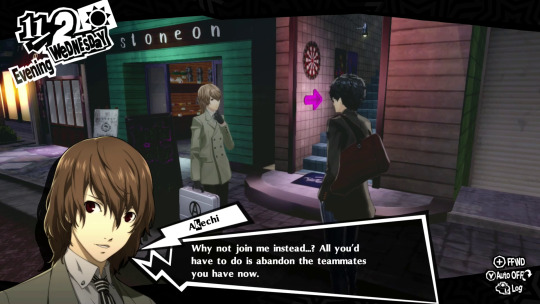
Akechi いっそ君がこっちに来るってのは?⋯今の仲間を捨ててさ。 isso kimi ga kocchi ni kuru tte no wa?... ima no nakama o sutete sa Why not join me instead...? All you'd have to do is abandon the teammates you have now.
It's very easy to focus on the first half of this question and miss the second. But that second half is the important part, the sting in the tail. The Japanese is a great example of wa building suspense: "Instead, what if you come over to my side, (AND THEN WHAT, AKECHI???????)"
The sentence is left hanging, with the weight of it unspoken (since wa emphasises what comes after it); Akechi is obviously not done speaking. And indeed, when he continues, it's a doozy:
"though, of course, you'd have to dump the friends you have now." (Yes, I think "friends" is often a much better translation of nakama than "teammates", fight me; it's even often translated as "friend" in P5 itself, or indeed, awkwardly, as "teammates and friends".)
Akechi is using the same verb, suteru, that you use for tossing something in the trash; the parallel meaning, "ending a relationship", exists in Japanese too.
Ryuji, Morgana, Ann, Yusuke, Makoto, Futaba, Haru, everything you've all gone through together and everything you've been—Akechi is suggesting you toss them aside like garbage. For him.
Now, I think part of Akechi would very much like Joker to do that. But he also knows better than to expect it. Because he knows Joker so much better than that.
Akechi has seen firsthand how loyal Joker is to his friends—remember on 1/2 how he says he investigated them all? He's seen some of the things Joker will do for them. He expects that blind faith to lead Joker to his death, much as Yaldabaoth does. But he also respects it.
This boy who's never had a friend, who's convinced himself the whole idea is stupid, is still drawn to the loyalty he sees in Joker. Even as he's preparing his own ultimate betrayal, Akechi recognises Joker's commitment to others. He understands treachery is bad, even though he himself is a traitor—just as he understands that murder is bad, and that doesn't stop him, either.
This question of whether or not Joker will betray his friends (and Akechi specifically) comes back on 2/2, of course—and in force.
so why does he ask
Akechi is not proposing that the two of them run off together. He's not asking to see what Joker will say. He doesn't impulsively make the invitation, and then run away when Joker says yes. He is, in fact, not even asking. He poses the idea of Joker abandoning all his friends as a counterexample. It's supposed to be something Joker would never consider, something he will find morally repugnant.
Which is why, if Joker says yes, Akechi is shocked, and essentially tells Joker not to make such stupid spur-of-the-moment decisions. Akechi is making a rhetorical point about what Joker is asking of him.
Remember Joker's statement that leads into Akechi's question:

Yeah. Joker either suggests that Akechi should give up everything he's doing and everything he believes in (even as Akechi confabulates about what those things really are), or he suggests, with the top option, that he's already done it.
And in return, Akechi says that Joker should join him... and throw away his friends and everything he's working for and everything he believes in, of course.
It's the second response to his question, where Joker turns him down flat, that makes it most obvious that this was what Akechi meant:
Joker それは無理だ sore wa muri da I'm not doing that. No way in hell. Akechi だろうね。 darou ne I thought as much. Akechi 分かるだろ、誰だって今の立場を簡単に捨てられやしないんだよ wakaru daro, dare datte ima no tachiba o kantan ni suterare yashinai n da yo I'm sure you understand. We all have our parts to play, and we can't simply leave those behind.
See what he's saying? ima no tachiba o kantan ni suterare yashinai—"we absolutely must not lightly set aside the positions we hold now".
Incidentally, yes, that's that same verb suteru that he used before, for casting aside or throwing away. Akechi is drawing a parallel between Joker's friends and his own goals—between the things each of them holds most dear, which neither of them will sacrifice, even to save the other. (Assuming you think Akechi would even be down to save Joker—but I do think conf 7 suggests that at this point, he might not be opposed to the possibility. It's just that it doesn't exist.)
the phone call
This parallel returns in the phone call afterwards, if you again tell him that you're rivals:
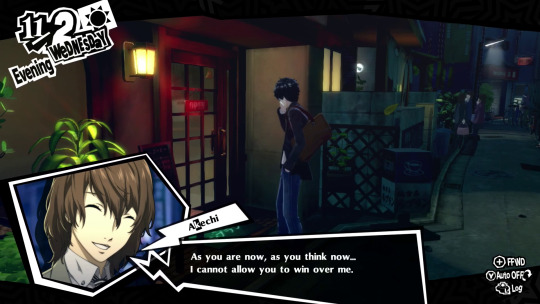
It's a little hard to tell from the localisation what Akechi is getting at, so let's take a close look:
Akechi 僕らにはお互い譲れないものがあって、そのためにも負けられない。 bokura ni wa otagai yuzurenai mono ga atte, sono tame ni mo makerarenai [lit. for both of us, these are things we cannot compromise on, and because of those things we cannot suffer losing.] Neither of us can afford to lose, because we fight in service of our principles. It's the same for both of us. Neither of us can afford to lose, because of these principles we won't concede. Akechi ⋯だからこそ、もしも君が自分を曲げたりしたら絶対に赦さないよ。 ... dakara koso, moshi mo kimi ga jibun o megetari shitara zettai ni yurusanai yo [lit. that's exactly why, if you were to warp yourself [that way], I would absolutely never let such a sin (t/n: note the kanji) pass.] And that is precisely why... I cannot allow you to change. ... And that's precisely why, if you betrayed yourself that way... I couldn't allow it. Akechi だって、僕が負けたくないのは『君』なんだから。 datte, boku ga maketakunai no wa "kimi" nan da kara [lit. it's you as you are now who I do not want to lose to.] As you are now, as you think now... I cannot allow you to win over me. The person you are now, with those principles, and that determination—that's the one I won't ever allow to beat me.
Here's my attempt at a translation again, so you can see it all together:
Akechi: It's the same for both of us. Neither of us can afford to lose, because of these things we won't concede. Akechi: ...And that's precisely why, if you betrayed yourself that way... I couldn't allow it. Akechi: The person you are now, with those principles, and that determination—that's the one I won't ever allow to beat me.
It turns out that this phone conversation, that was originally quite mystical-sounding and hard to follow (what were you trying to say, Akechi?) is quite straightforward. It ties into to his original question. "Will I join you, Joker? Well, what if you join me instead? Just throw away all your little friends for my sake? Of course you won't—because we're the same. Both of us have things we can't give up, no matter what—and if you tried to do that, I wouldn't let you, because I value you as you are...."
This parallel between the two of them is what conf 7 is about, from the text message that opens it to the phone call that concludes it:
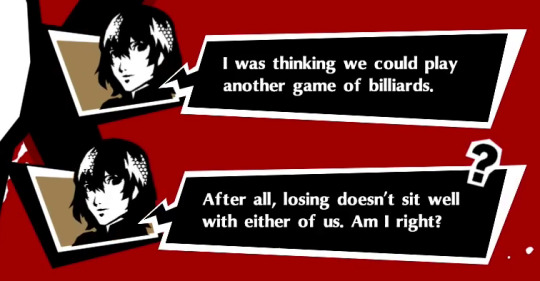
It's the same thing again: neither of you can afford to lose, because you're fighting for your principles. The billiard table is the stage for this wider discussion.
The billiard scene, of course, is interesting for another reason—Akechi is giving Joker a chance to back out; he's testing his commitment, and perhaps hinting that he never intended to be quite where he is, either. He states at the outset that he's being indirect, that what he's saying is a metaphor—and then closes that metaphor with a very direct question: "Do you still intend to play this game?"
Akechi それでも君は、このゲームを降りる気はないの? sore demo kimi wa, kono geemu o oriru ki wa nai no? Even then... do you still intend to play this game? But despite all of that, you still won't fold, will you?
The Japanese is even more specific: Akechi asks Joker if he intends to fold—not whether he still wants to play, but whether he means to give up entirely! "This can't be what you expected, so how about it? Will you just give up? Does this mean as much to you as it does to me? Is this a game we both choose to play, or are you just a victim?"
How much of this is Akechi blowing smoke up his own ass?—casting the fact that he's about to murder the boy in front of him in a glowing, romantic light? Pretty much all of it, I'd say. He's dreamed of having a rival, someone to compete with who challenges him, but what he's got is quite a bit more than that.
Again, the rival imagery is what allows Akechi not only to accept this close relationship, but to frame it as a life-or-death contest that only one of them can win. It confirms to him that what Lavenza describes as "a truly unfair game" is actually fair. It's about making Joker's murder seem as much Joker's fault as his own.
but what happens if you say yes?
Despite all of this, you can choose to have Joker consider Akechi's "offer"—to discard Ryuji, Morgana, Ann, Yusuke, Makoto, Futaba and Haru like trash, and assist Akechi instead. It's tempting, I know.
I don't personally get the impression that Akechi likes this response, for a number of reasons. None of the three responses to his offer score confidant points, but there's something else in play: only one of these responses unlocks his third awakening.

See the F code highlighted in yellow? Only one of these three responses has it. "You're my rival" counts towards the third awakening. Rejecting him, with "I'm not doing that", does not—but more to the point, offering to be with him, with "I'll think about it", also does not!
The issue is confused because a number of us have taken option 1 (or indeed option 2, like me) and still got the third awakening on 2/2. It seems like you need some of the flagged responses, not all of them. But it remains the case that "I'll think about it" does not make Akechi more likely to have his third awakening.
What happens if you take this option?
Joker 考えておく kangaete oku I'll think about it. Akechi へえ、考えてはくれるんだ? hee, kangaete wa kureru n da? Oh? So you'll think about it, at least? What? You mean you'll consider it? Akechi ⋯でも、そういうその場限りの情はやめた方がいい。 ...demo, sou iu sono ba kagiri no jou wa yameta hou ga ii ...But I'd advise you don't say these things without their due consideration. ... Still, it would be better if you didn't trust such fleeting sentiments. Akechi 出来もしない約束はするものじゃないよ。 deki mo shinai yakusoku wa suru mono ja nai yo You shouldn't make promises that you can't keep, anyway. Don't be the sort who promises the earth and walks away.
A few grammar points:
んだ n da on a question demands an explanation; Akechi's question could almost be rendered "Why on earth would you need/want to think about it?"
そういうその場限りの情 sou iu sono ba kagiri no jou—"sentiments that only matter here and now". Essentially, "sentiments that won't last"—or that are makeshift or ad hoc; Joker is making a stupid spur-of-the-moment decision.
yes, 出来もしない約束 deki mo shinai yakusoku translates idiomatically as "promising the earth". The point is not that Joker should not promise; the point is that he shouldn't be the sort of person who promises so much—and then doesn't follow through.
Again, this confidant is all about Akechi's expectations for Joker. It's about the weird belief he has in him, like the belief he has in Shido—that Joker has principles and friends and will stand by them, that those things are important and matter, even if they're diametrically opposed to Akechi's principles and the things he wants.
The fact that they foil each other in this way is a large part of what makes Joker such a worthy opponent for Akechi. So if Joker turns around and says, sure, Akechi, I'll dump all my friends so we can make out?
Akechi does not like that. He thinks better of him!—he loses respect if Joker offers this. Even if that little line about "promising the earth" suggests that, actually, yeah, he would quite like for the two of them to run away together—if only they lived in a world where it was possible.
what about "you're my rival"?
I've discussed this line before, but let's go into it for completeness.
Joker 明智は好敵手だ akechi wa koutekishu da You're my rival. Nah, you're my worthy opponent.
Do you see that Joker names Akechi there? He doesn't just say, "we're worthy opponents", or even "you're my worthy opponent", koutekishu da yo.
No, he picks Akechi out by name, and then tells him exactly what they are to each other. Because wa builds suspense. Akechi wa... (what?! what is he?!) koutekishu da. "I can't run away with you, because I need you to be this to me instead".
And this is the line with the F-code. This is the line that, if you choose it, will build towards Akechi's third awakening—which is centred on his trust in Joker, on the fact that Joker is worthy of that trust.
And how does Akechi respond?

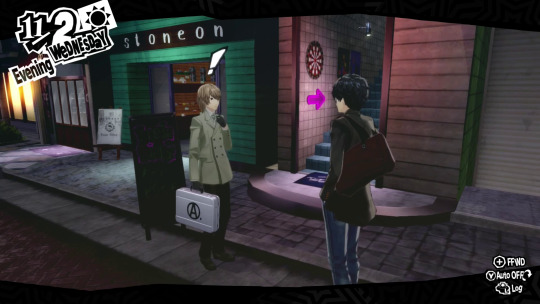
He's astonished. He did not expect this at all, look:



On the left, the top screenshot where he's waiting for your answer; in the centre, the moment of shock, where he's pulled away and dropped his hand and his eyes are wide; on the right, a comparative overlay just to demonstrate that he pulled back.
smiles that aren't smiles
I have a half-assed theory that you can tell when Akechi is really smiling—because the model will smile with him. If you watch, for instance, Ryuji, the model's expressions match the sprite's almost exactly. But if you watch Akechi? Nah, not so much.
Here's an example. Akechi appears to smile quite often through conf 7—but if you glance away from the sprite and textbox to the model, the model is pokerfaced. Five smile sprites on the optimal route through conf 7, and not one of them—not even "you truly are fascinating"—matches the model:
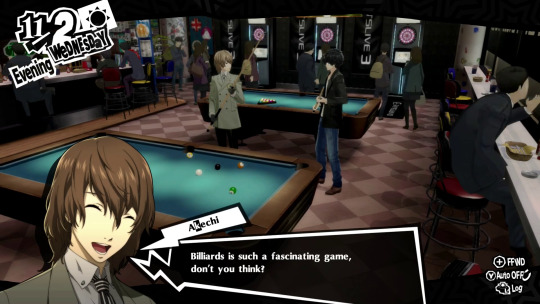
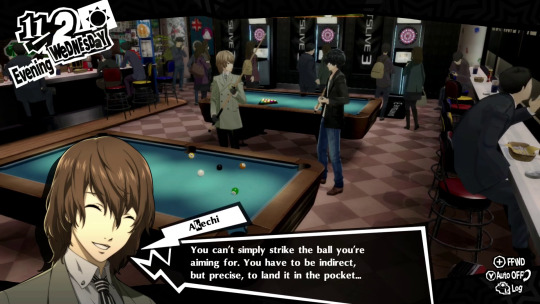
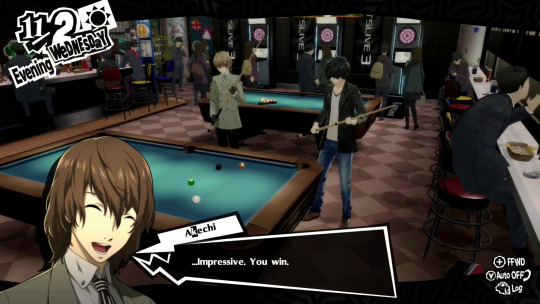
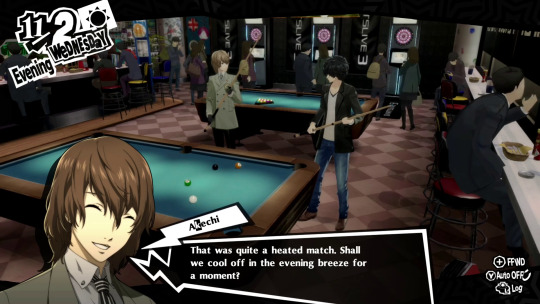
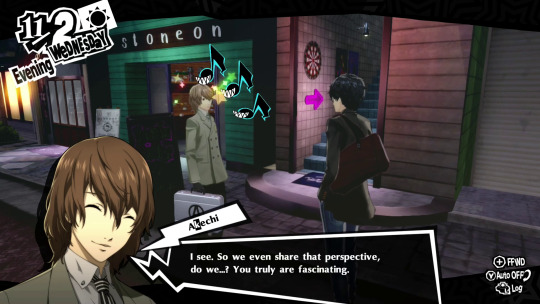
But when you pick "You're my rival"? Suddenly the model's face springs to life:


It's obvious from everything else that this moment is of deep significance to Akechi. But this little detail with the smiles suggests we can confirm it.
and what does he say?
It doesn't take long for him to pull himself together:
Akechi 同意だね、僕らにはなれ合いより対等な関係こそふさわしい。 doui da ne, bokura ni wa nareai yori taitouna kankei koso fusawashii I agree. I think a relationship of equals suits us better than being co-conspirators, anyway...
This is another one that I find unclear in the localisation, so let's have at it.
nareai suggests an illicit or unduly-close union. It suggests "being in bed together" in the business sense—cosying up, colluding, conspiring. It suggests they're working together when they shouldn't be. Jisho uses the screamingly-outdated term "common-law marriage" (what we call "living together") as an example. Essentially, it suggests they're too close—or even co-dependent, in a way that corrupts them both.
In short? Akechi's "co-conspirators", nareai, means "accomplices"—what we might call "murder boyfriends".
taitouna kankei—literally, "an equal relationship"—is a set phrase, and we know what it means. It suggests a relationship where nobody is being cheated; where everyone gets out what they put in. Where the two of them compete on equal terms.
That's a very Akechi way to look at relationships. But it's also a relationship where nobody is in charge; nobody is dominant, and everyone has self-respect. Nobody is chasing after anyone or sacrificing unduly, as either would be if they joined the other. Everyone can be who they are and say what they want. Everyone can say no.
It's the sort of relationship Akechi very notably does not have with Shido. Is it the sort of relationship he has with Joker, when the two of them are hiding so much from each other and lying so much, and there's so much, like, murder going on? Nah. But as an aspiration, as a suggestion of the sort of relationship Akechi would like them to have, alongside everything else he's told us about how he sees the two of them—as similar, as equals and opposites, as bound by their principles, as destined to fight—it's almost touching.
and what does joker think?
Akechi ⋯たとえこの先、何があろうともだ。 ...tatoe kono saki, nani ga arou tomo da ...No matter what else may change. ...No matter what might come next. Akechi それだけの事を言っ��んだから、逃げないでよ? sore dake no koto o itta n da kara, nigenaide yo? In any case, what you just said carries great weight. Remember what you decided, and don't run from it. All right? [lit. don't run away just because of what [I/you] said, all right?]
I'm not sure about this. It feels like it should be referring back to Akechi's last line—"don't get cold feet and run away just because I alluded ominously to whatever's coming next, okay?". I guess it could be referring to Joker's commitment, with "You're my rival"? IDK, I'm out on this one, so I'm inclined to give the localisation the benefit of the doubt.
But it doesn't matter. Because the significance of what Joker does next doesn't change:
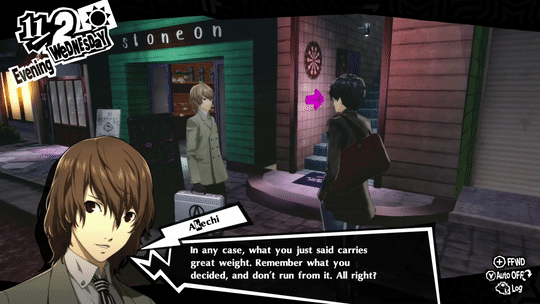
He nods. Akechi spends the whole confidant hinting that something ominous is coming, and that the two of them are heading to an inevitable confrontation, and Joker nods.
I don't think this is really consistent with interpretations where Joker is a meek little sheep in the interrogation room. Joker might not have chosen this, he might not have wanted it, he might have by far preferred to avoid it. He'd happily back out if Akechi would just drop the whole thing and agree to act sane. But he's committed to it. He agrees to fight.
Remember, conf 7 takes place after Joker hears the murder phone call. He knows what Akechi is. He knows what he's planning. He knows the stakes—and he agrees to play, to face Akechi down.
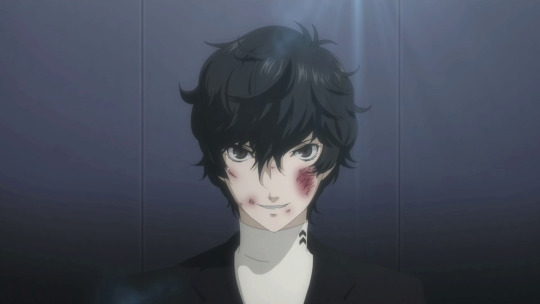
To quote @nardaviel, that's no sheep. That's a full-on "Phantom Thieves win again, motherfucker" smirk. Joker played Akechi's game, with everything he had—and he played to win.
#persona 5#p5 meta#japanese language#shuake#goro akechi#ren amamiya#almost the worst part of this is that akechi respecting joker for his loyalty tells you how little he respects himself#also! 'i'll think about it' CANNOT POSSIBLY unlock the third awakening#because the third awakening is *all about trust* and saying yes to akechi proves that you're a traitor#and that 'i won't forgive you if you betray your principles' on the phone? also 2/2. this is exactly what he does if you take the deal#also!! joker makes a third option to akechi's question with 'you're my rival' and this is what astonishes him besides the thing itself#also! (per leonawriter) the maruki deal ending is essentially the nareai relationship#where akira has all the power and akechi..? well#nobody is themself or choosing for themself#also as regards whether akechi is lying he proves himself through action#'i won't let you betray yourself' - he did that already if you tried to take the deal#ALSO? that 'megeru' for 'i won't let you depart from your principles comes back on 2/2#as joker's 'i won't fold'#and ofc it's ALSO akechi's 'you'd fold over...' that precedes that. it was set up in conf 7 if you took the rival route#so tldr it's plausible that 2/2 is as much akechi fighting for his vision of joker as for his right to die. help???#ALSO. did you wonder why it's *awakening* akechi who comes to leblanc? the one closer to you who believes in you more?#this is exactly why. awakening akechi has faith left in you to lose. non-awakening akechi already lost that faith. BYE
647 notes
·
View notes